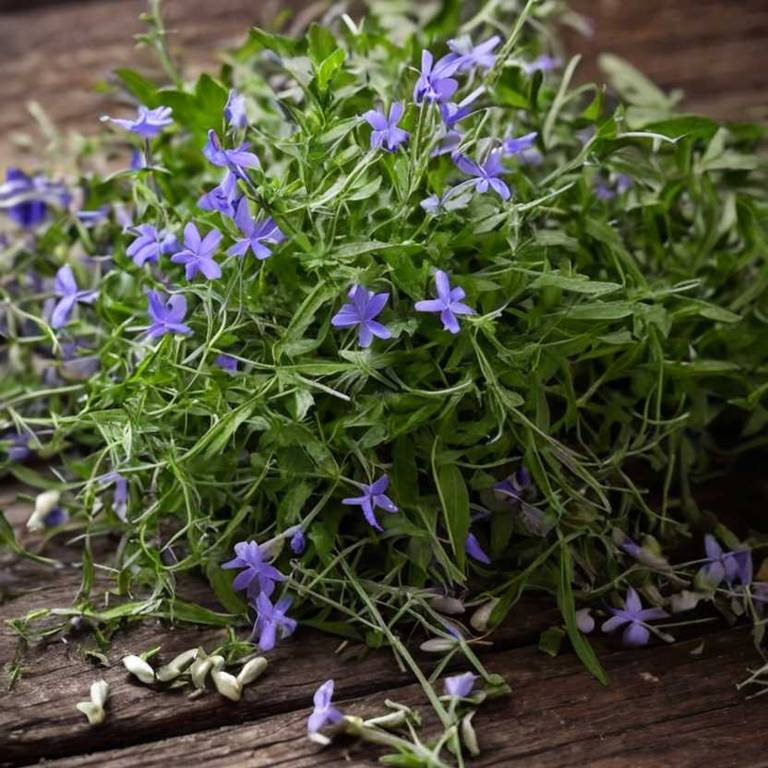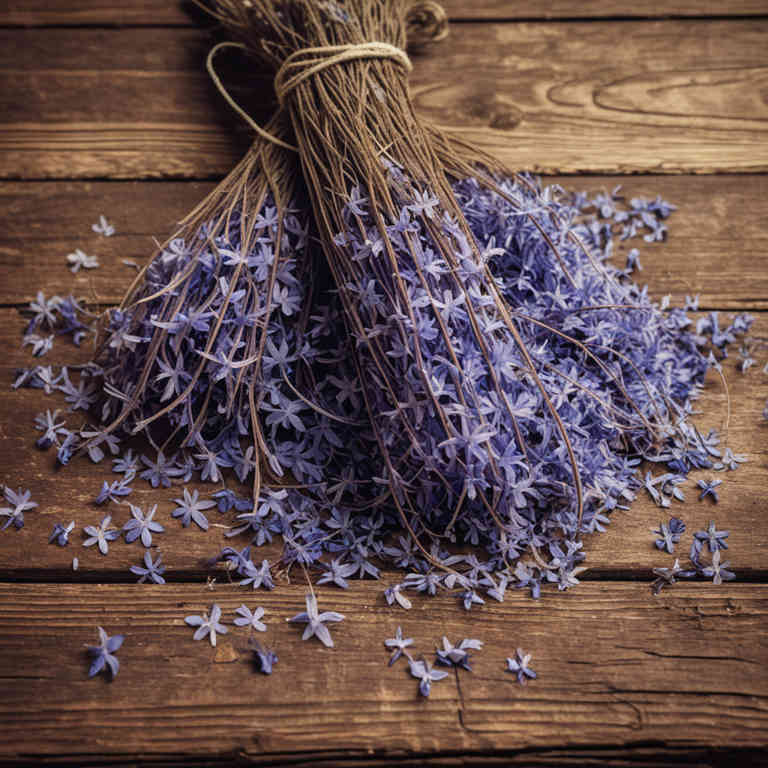10 Best Lobelia Inflata Preparations

The best medicinal preparations of Lobelia inflata are teas, decoctions, tinctures, mucillages, and syrups, each offering unique benefits for respiratory and digestive health.
Teas and decoctions are commonly used to soothe coughs and ease breathing, while tinctures provide a concentrated form for more potent effects.
Mucillages, derived from the herb's gel-like substance, are valued for their soothing properties in treating inflammation.
Syrups are often used to ease throat irritation and support respiratory function.
These preparations have been traditionally employed in herbal medicine for their calming and expectorant qualities.
Below there's a list of the 10 best herbal preparations of lobelia inflata for medicinal purposes.
- 1. Teas
- 2. Decoctions
- 3. Tinctures
- 4. Mucillages
- 5. Syrups
- 6. Linctuses
- 7. Capsules
- 8. Lozenges
- 9. Poultices
- 10. Creams
1. Teas
Lobelia inflata teas is commonly used to treat respiratory conditions, such as asthma and bronchitis, as well as to alleviate symptoms of depression and anxiety.
It is also used to support digestion and reduce inflammation. The most common medicinal uses include relieving coughs, easing breathing difficulties, and promoting emotional well-being. The bioactive constituents responsible for its medicinal properties include alkaloids like lobeline, which affects the nervous system, and flavonoids, which have anti-inflammatory and antioxidant effects.
Additionally, the plant contains saponins and mucilage, which contribute to its expectorant and soothing properties.

2. Decoctions
Lobelia inflata decoctions is commonly used to treat respiratory conditions, such as asthma, bronchitis, and coughs, as well as to aid in reducing anxiety and promoting relaxation.
This herbal preparation is also used to support digestion and alleviate symptoms of nausea and vomiting. The most common medicinal uses include respiratory support, calming effects, and digestive aid. The bioactive constituents responsible for these effects include alkaloids like lobeline, which acts as a stimulant and bronchodilator, and flavonoids, which have anti-inflammatory and antioxidant properties.
Additionally, terpenoids and mucilage contribute to its soothing and expectorant actions.

3. Tinctures
Lobelia inflata tinctures is commonly used to treat respiratory conditions such as asthma, bronchitis, and coughs, as well as to alleviate symptoms of anxiety and stress.
These tinctures are also used in traditional medicine to help with digestive issues, including nausea and indigestion. The most common medicinal uses of this herbal preparation include respiratory support, calming effects on the nervous system, and digestive aid. The bioactive constituents responsible for these effects include alkaloids such as lobeline, which acts as a stimulant and bronchodilator, and various flavonoids and saponins that contribute to its anti-inflammatory and antioxidant properties.
However, it is important to note that lobelia inflata can be toxic if misused, and it should only be used under professional supervision.

4. Mucillages
Lobelia inflata mucillages is commonly used to treat respiratory conditions such as bronchitis, asthma, and coughs due to its expectorant and antispasmodic properties.
It is also used to alleviate symptoms of digestive disorders like indigestion and colic. The mucillages are known for their ability to soothe inflamed tissues and promote mucus clearance from the airways. The bioactive constituents include alkaloids such as lobeline, mucilage polysaccharides, and flavonoids, which contribute to its medicinal effects.
These compounds work together to reduce inflammation, relax bronchial muscles, and enhance respiratory function.

5. Syrups
Lobelia inflata syrups is commonly used to treat respiratory conditions such as bronchitis, asthma, and coughs.
The preparation is believed to help loosen mucus and ease breathing, making it a traditional remedy for congestion and chest tightness. It is also sometimes used to alleviate symptoms of nervousness and anxiety due to its sedative effects. The bioactive constituents responsible for these properties include alkaloids like lobeline, which act on the nervous system, and mucilage, which has soothing and demulcent properties.
Additionally, flavonoids and essential oils contribute to its anti-inflammatory and expectorant effects.

6. Linctuses
Lobelia inflata linctuses is commonly used to relieve respiratory symptoms such as coughing, bronchitis, and asthma.
This herbal preparation is particularly valued for its ability to act as an expectorant and bronchodilator, helping to loosen mucus and ease breathing. It is often used in traditional medicine to treat conditions involving excessive mucus production or airway constriction. The bioactive constituents responsible for its medicinal properties include alkaloids like lobeline, which may stimulate the nervous system and enhance respiratory function, as well as flavonoids and mucilage that contribute to its expectorant effects.
These compounds work together to provide the plant's therapeutic benefits in respiratory ailments.

7. Capsules
Lobelia inflata capsules is commonly used to treat respiratory conditions, such as asthma and bronchitis, as well as to aid in weight loss and improve digestion.
They are also used to alleviate symptoms of depression and anxiety, and to support detoxification processes in the body. The most common medicinal uses include treating respiratory ailments, digestive issues, and mental health conditions. The bioactive constituents responsible for these effects include alkaloids such as lobeline, which acts as a stimulant and bronchodilator, and various flavonoids and glycosides that contribute to its anti-inflammatory and antioxidant properties.
These compounds work together to provide the plant's therapeutic benefits.

8. Lozenges
Lobelia inflata lozenges is commonly used to relieve respiratory symptoms such as coughing, bronchitis, and asthma.
These lozenges are often employed to ease breathing and reduce inflammation in the airways. The most common medicinal uses include treating respiratory conditions, digestive issues, and as a sedative. Bioactive constituents such as alkaloids like lobeline, flavonoids, and mucilage contribute to its medicinal properties.
Lobeline, in particular, is believed to act on the nervous system and may help in reducing coughing and easing muscle spasms.

9. Poultices
Lobelia inflata poultices is commonly used to treat respiratory conditions such as bronchitis, asthma, and coughs, as well as to alleviate pain and inflammation.
These poultices are also applied topically to reduce swelling and promote healing in wounds or muscle aches. The most common medicinal uses include easing respiratory distress, reducing inflammation, and providing relief from muscle pain and spasms. The bioactive constituents responsible for these effects include alkaloids like lobeline, which act as bronchodilators, and other compounds such as flavonoids and mucilage that have anti-inflammatory and soothing properties.
However, due to its potent nature, Lobelia inflata should be used with caution and under professional guidance.

10. Creams
Lobelia inflata creams is commonly used to treat respiratory conditions such as asthma and bronchitis, as well as muscle pain and inflammation.
These creams are often applied topically to reduce swelling and ease discomfort in conditions like arthritis and muscle strains. The most common medicinal uses include alleviating respiratory distress, easing coughs, and providing relief from muscle aches and joint pain. The bioactive constituents responsible for these effects include alkaloids such as lobeline, which has bronchodilatory properties, and other compounds like flavonoids and terpenoids that contribute to anti-inflammatory and analgesic effects.
However, due to its potent nature, Lobelia inflata should be used with caution and under professional guidance.
